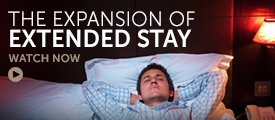Airbnb just keeps growing. According to the website it has now had 60 million guests, 2 million listings worldwide, and is used in 34,000 cities. Summer travel with Airbnb has grown 353 times over in 5 years. In summer 2015, nearly 17 million total guests stayed with Airbnb hosts.
Other couch surfing/ hosted accommodation sites include 9flats.com, homestay.com and couchsurfing.com.
What does the growth of this type of accommodation really mean for hospitality and how does the impact vary across sectors? Our experts discuss:
Competing with Airbnb is made more complex by the fact that it offers such a variety of accommodation types. It could compete with everything from a hostel to a luxury hotel. The accommodation on offer includes yurts, RVs, boats and castles. Airbnb appeals to both holiday makers and business travellers so can impact all corners of the market at different levels.
Airbnb is typically most popular in cities. Top destinations for business travel are San Francisco, CA, London, UK and New York City, NY, and Paris, France. At the beginning of this year Airbnb also released some statistic about more surprising destinations that are gaining momentum including Chūō-ku in Osaka, Japan which had 7000% Growth in 2015, Brickfields, Kuala Lumpur, Malaysia, which had 1200% Growth, and Poncey-Highland in Atlanta, GA which had 240% Growth.
If you’ve been sent to this page and you’re not yet on the circulation list to receive these regular briefings and you would like to sign up, you can do see here. It’s free.
Video clips produced by ybc.tv for the Hospitality Channel, including interview from industry conferences such as the IHIF conference as well as specific Hospitality Channel shoots.



